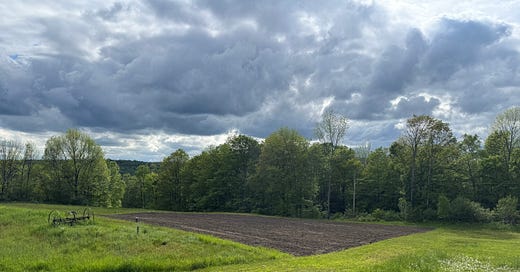Author’s Note: this essay is part of the Reports from the High Wood series, a weekly premium report from our homestead that offers you enduring lessons for living well in a wounded world. If you're drawn to green paths, perennial values, and timeless beauty that resists the modern glare, you're in the right place.
Here are some of our past beekeeping posts that will give context if you are new here:
A very odd and wonderful thing happened this week while we were planting flowers. For context, allow me to explain the background of the planting. Last year, we noticed there were no wildflowers in July. It was simply too dry, too hot, and we did not receive enough rain. This was a problem for our bees and for us, as they were just finishing off filling the frames of their second deep super structure and were getting ready to start on the honey supers we would later harvest; if all they were eating was sugar water to stay alive, then they were not making honey. This year we decided to get ahead of this problem by asking our neighbor to till a large section of our field with his tractor so that our family could plant twenty pounds of wildflower seed in it along with some flowering plants like pumpkins. Planting offers us time for reflection, it invites meditation, and the lessons learned in the field this week were profound.
There was a strange feeling I couldn’t shake during the sowing. There was this sense that I was getting away with something. As I pressed seeds into the soil, the land that I own, a quiet part of me half-expected someone to come out of the woods, wagging a finger and telling me to stop. It felt mischievous, almost illegal. The feeling resembled pulling off a heist. It reminded me of the excitement, the nervous feeling in my stomach I felt when my friends and I stole the doors off the classrooms at our high school as part of a senior prank. Sowing the seeds, covering them lazily with my bare feet, watching for rain and crows…it all felt like an illicit act of rebellion. At first, I could not name why this feeling had taken hold. Planting flowers should feel peaceful or hopeful or boring. Instead, it felt subversive. It was as though the very act of creating beauty, of planning for summer joy, of giving our bees an advantage, had violated an unspoken rule I did not know I was following. I was tricking something.
Eventually, I figured it out. I was not defying a neighbor or subverting some actual law. I was tricking the quiet static voice inside my mind that insists nothing will work, that nothing good can happen. I was slipping past the watchman who whispers that everything is doomed, that the world is in free fall, and that trying to make it better is naïve at best. This voice is hard to identify directly. It doesn’t raise its head openly. It creeps in quietly, asking whether anything will sprout, whether the weather will hold, whether anyone will care about our little humming meadow, the honey, the tradition. It makes even the act of preparing for joy feel foolish. Modern life teaches us this voice well. We are trained by news cycles, bureaucracies, and endless digital commentary to expect failure. What we were doing in the field was not planting against the dryness of July alone. We were planting against despair.
We were performing an act of hope so earnest it felt criminal.
Keep reading with a 7-day free trial
Subscribe to Echoes from an Old Hollow Tree to keep reading this post and get 7 days of free access to the full post archives.











